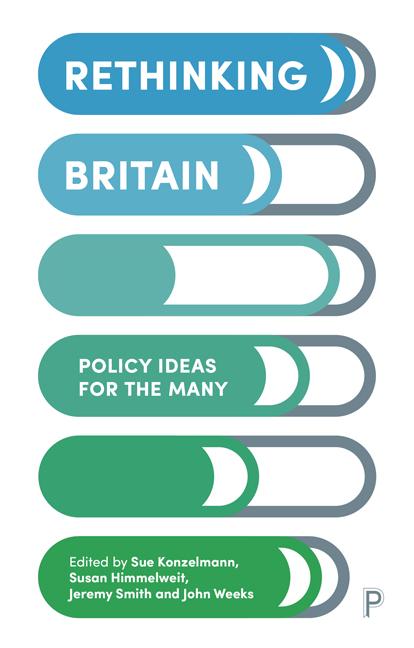Book contents
- Frontmatter
- Contents
- List of Tables and Figures
- The Contributors
- Foreword
- Introduction
- Interlude: ‘Mirror, Mirror, On the Wall – Who has the Highest Debt of All?’
- Part One Building a Full-Employment Economy: Introduction
- Part Two Public Investment – Prioritising Society Rather than Profit: Introduction
- Part Three Making Finance Work for Society: Introduction
- Part Four Genuine Social Security: Introduction
- Part Five How to provide for Social Needs: Introduction
- Conclusion
- Jargon Busters
- References and Further Reading
- Index
5 - How can Finance Better Serve the Real Economy?
Published online by Cambridge University Press: 11 March 2021
- Frontmatter
- Contents
- List of Tables and Figures
- The Contributors
- Foreword
- Introduction
- Interlude: ‘Mirror, Mirror, On the Wall – Who has the Highest Debt of All?’
- Part One Building a Full-Employment Economy: Introduction
- Part Two Public Investment – Prioritising Society Rather than Profit: Introduction
- Part Three Making Finance Work for Society: Introduction
- Part Four Genuine Social Security: Introduction
- Part Five How to provide for Social Needs: Introduction
- Conclusion
- Jargon Busters
- References and Further Reading
- Index
Summary
What's the issue?
Following the 2008 financial crisis, UK financial regulation was redesigned, putting much more emphasis on providers’ financial soundness, as well as on monitoring systemic risk. But, although it is an improvement, the current combination of prudential, systemic and retail financial regulation is still more likely to drive excessive risk-taking out of sight (and off the balance sheet) than to reduce it. It will probably also increase moral hazard for customers, who are likely to assume that financial products and selling processes have been officially tested and approved. Nor does current regulation address the problem of ‘too-big-to-fail’ financial institutions counting on state aid in the event that their gambling losses prove excessive.
Equally worrying is the softening of safeguards for customers (small and large businesses, and households trying to build savings and pensions), whose value for money has been reduced by the need to rebuild providers’ profits, while the safety of their money is still not guaranteed.
How can finance be made to serve the real economy and society better?
Analysis
While their early performance has so far been good, given their limitations, the new regulatory arrangements won't be effective unless the regulation of conduct is matched by equally tough guidelines for financial products and structures. These were once central to regulation, resulting in fewer fraud, mismanagement and mis-selling scandals – not to mention, systemic crises. On its own, conduct-based regulation will always limit regulators’ effectiveness – not least because financial firms can not only easily overwhelm even the best watchdogs with excessive detail; they can also conceal vital facts and/or blind them with alchemy. Without product and structural regulation, the UK will continue to be saddled with an over-expanded financial sector that short-changes its clients and fails to deliver the higher returns it promises to justify excessive (and ultimately socialised) risk.
Many who praise (and/or practise in) banking, insurance and securities trading firms agree that regulators will never foresee every looming crash – partly because they tend to prepare for yesterday's crisis instead of the next one. They also lack the information that would allow them to monitor whole markets for risk. And with increasingly high-speed automated trading (the social value of which is entirely unclear), regulators might well be unable to process the data in time, even if they had it.
- Type
- Chapter
- Information
- Rethinking BritainPolicy Ideas for the Many, pp. 122 - 127Publisher: Bristol University PressPrint publication year: 2019



